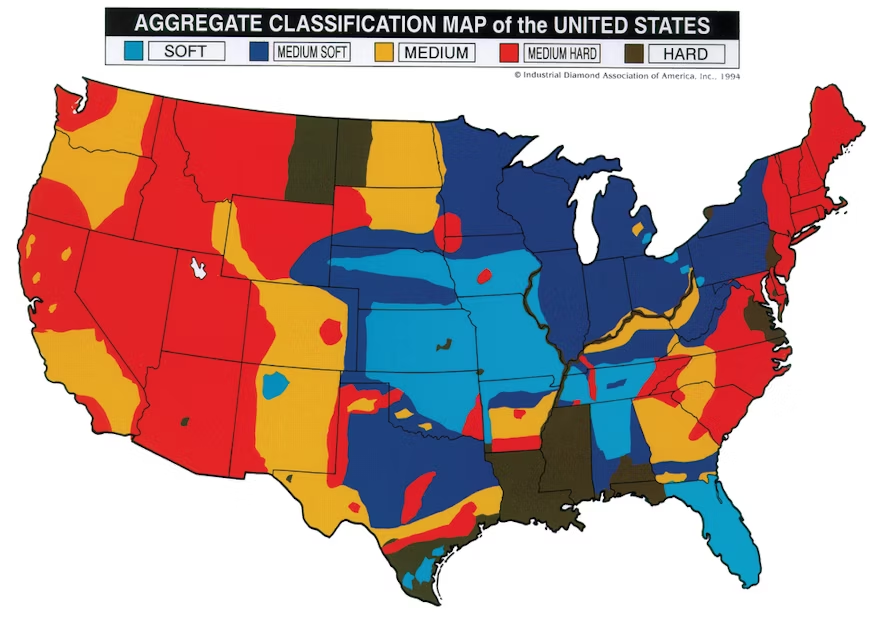What geology can tell us about Kevin Durant's next team
When NBA superstar Kevin Durant left the Oklahoma City Thunder to join the Golden State Warriors, he said that doing so was taking "the hardest road". This was met with a lot of mockery, because the Golden State Warriors had just won 73 games, the most in NBA history, the previous year.
It was widely regarded as an uncool move, ring chasing, the ultimate bandwagon riding. It was clearly an absurd thing to say about the level of challenge he chose. It also made the NBA less interesting for several years, so he deserved some hate for it.
What people missed was that according to geology, he wasn't totally off-base. Streets are paved with asphalt, which is a combination of local rocks (aggregate) and tar. That means that some regions of America have harder roads than others, based on the local geology:
Oklahoma City is located right in the center of Oklahoma, with some of the softest aggregate in the United States. It's reasonable for someone who cares about road hardness to want to leave. Just about anywhere (except for Florida) would have been an improvement.
The "hardest road" out of OKC at that time would've been the one to New Orleans. It's about a 700 mile drive, and it looks like it's a nice gradient from some of the softest roads in the United States to the very hardest ones.
The New Orleans Pelicans at the time were pretty bad, basically just Anthony Davis, a couple good role players (Ryan Anderson, Jrue Holiday), and a rich collection of "Let's Remember Some Guys" Guys (Jimmer Fredette, Nate Robinson, Luke Babbitt, Ish Smith, Alonzo Gee, Norris Cole). KD and AD on the same team would have been cool, but even with Kevin Durant, the Pelicans would likely have been pretty bad. Certainly worse than the OKC team that Durant wanted to leave.
Although technically the "hardest road" out of Oklahoma City, going to New Orleans would have been a poor career choice for KD. The Pelicans have always been a cheap, poorly run team. I can't imagine it being a destination for any free agent of Kevin Durant's caliber.
He really should have said "I'm taking the hardest road that doesn't lead to a mismanaged tire fire of a team. Also by "hardest" I mean on the Mohs scale, not the challenge" and everybody would have understood.
Northern California has a medium-hard substrate, so his choice to go to the Warriors was definitely a harder road than a lot of other places he could have gone. Since leaving the Warriors, he's played for two other teams with medium-hard roads: the Brooklyn Nets and the Phoenix Suns. He's never chosen to take a softer road. Give him credit for that.
Now that there are rumors about Kevin Durant being traded from the Suns, what can geology tell us about Durant's next destination?
The other NBA cities with medium-hard to hard roads are New Orleans, Boston, Charlotte, Houston, New York, Sacramento, Utah, and Washington DC. He's from DC so that might be nice. But Durant always says he wants to compete for a championship. So we can rule them out, as well as New Orleans, Charlotte and Utah.
I can't really see Boston or New York wanting to tweak their rosters too much, because they're both already good enough to win a championship and don't have a lot of tradeable assets. Sacramento's not a great fit. The Kings would be dreadful on defense, and have too many players who need the ball at once.
That leaves Houston. Durant would fix the Rockets' biggest weakness -- not having a go-to scorer -- and Houston could surround him with a bunch of guys who can play defense. Most importantly, he'd get to continue to drive on medium-hard roads.
Kevin Durant to the Houston Rockets. The geology doesn't lie.
 (
(